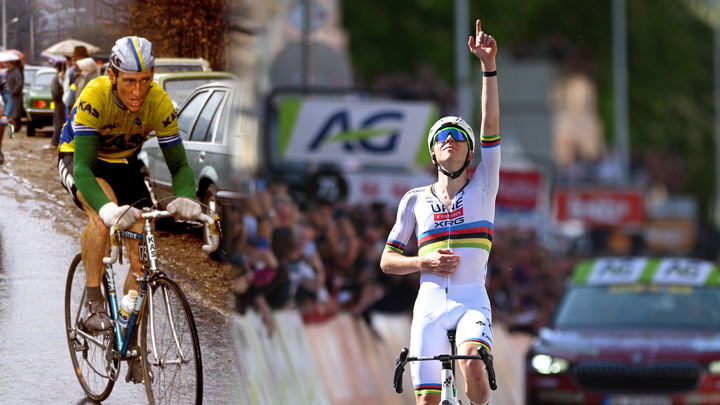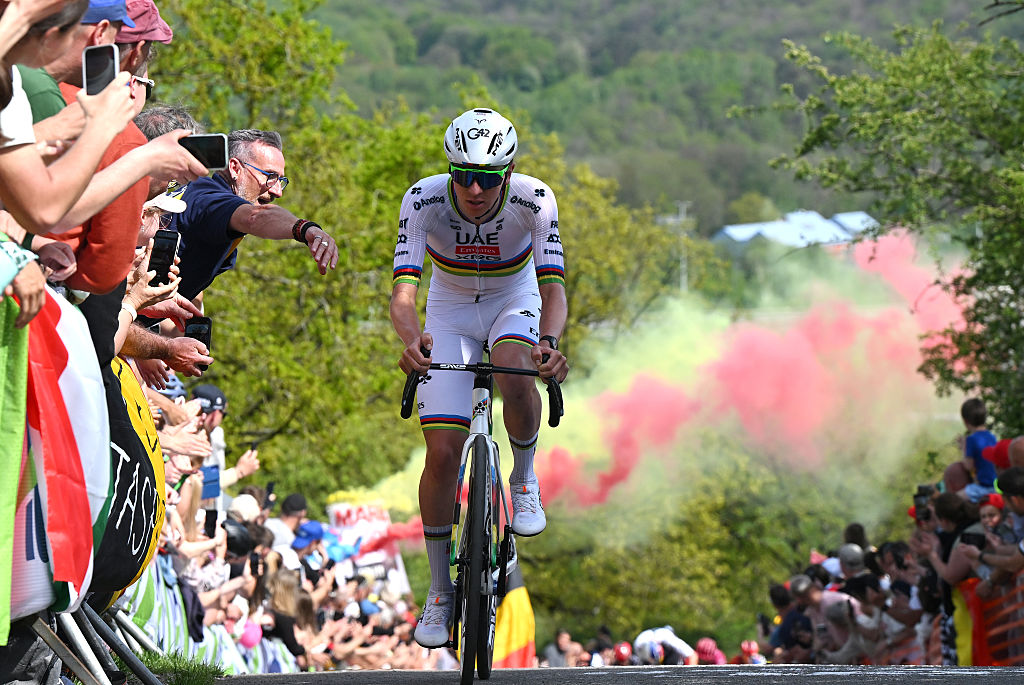
Watching Tadej Pogačar riding away from the opposition towards victory on Sunday, I remembered how doing the Ardennes Double - winning Flèche Wallonne and Liège-Bastogne-Liège in one season - used to be seen as an epic achievement in itself. But it just shows how good he has been across the whole Spring Classics that when Pogačar became the first rider to win both Flèche and Liège since Alejandro Valverde in 2017 this weekend, his 'doing the double' has barely been noticed. Instead, it's all part of a much bigger, even more amazing, picture.
Another element of Pogačar's success that hasn't been mentioned so often - and once again, maybe Pogačar doing so brilliantly individually has something to do with it - is how collectively his team have taken a big step forward in the Classics this year.
It certainly wasn't for the first time this Spring, but you could see that improvement again from how well they worked at Liège in the vital moments, such as when guys like Brandon McNulty and Pavel Sivakov were taking Pogačar onto the Redoute.
When they already put that pace up so high - and before that another UAE guy, Domen Novak, had already been riding like a bloody motorbike for hours and hours - then when Pogačar went on the attack he was already two or three steps ahead of the rest. Particularly when he's so explosive an attacker himself, there's nothing the others can do.
Unfortunately, too, it just got messy behind. If four or five guys had got to working together and chasing, things might have been different, but instead they immediately start thinking about getting on the podium and were attacking out of that group like Tom Pidcock did.
Meanwhile, Pogačar was simply getting further and further away. With a minute, he could ride more conservatively and take it all the way to the finish. It doesn't make for great race viewing over 35 kilometres, unfortunately, but whenever you give Pogačar an inch, you know he's going to take a mile every time. His time trialling ability and power to stay out front meant there was never a chance of his getting caught in the final, either.

You could ask why Pogačar was able to dominate so well in Liège after losing in a similar scenario in Amstel. But the key thing to remember is Amstel is much easier. In Liège, you have 10 categorised ascents, but there's so much climbing that you could easily categorise 20.
That makes it a constant wearing-down process, and the way the super-hard climbs keep coming at the end, like the Redoute and the Roche-aux-Faucons, both of which are so steep at the top, means everybody really feels it. Everyone except Pogačar, that is - he just sprints up them and he's still in the saddle, too. The others are all over their bikes, trying to fight back, but he makes it so easy.
It's crazy to say it, but if Pogačar stopped racing this year right now, his season would already be a huge success. If you look back at Strade and then the way he's been up there in so many different types of races since then, all the way from San Remo and Flanders, across to Paris-Roubaix to Flèche and Liège, you can't find a place where the rivals can put him in difficulty. There isn't one. I look back at when I was doing in Liège and my God, how much I had to suffer to stay with the other guys on the climbs. But if I got over them, I knew when we finished down in Liège I could do something in the sprint. Pogačar, though, just rode away on the Redoute, although if he had actually opted to fight it out in a sprint against the other podium finishers, [Ben] Healy and [Giulio] Ciccone - the odds are he'd have beaten them there too.
However, I know from personal experience, when you look back at your career, the big races that you win - you take them, you say, yes, that was great. But it's the ones that you lose and you feel you could have won, where you made a little bit of a mistake, which I did in the Tour of Flanders, for example, they're the ones that you think about, too, when you review your campaign.

Onto the summer - and next year
So Pogačar will already be looking at Paris-Roubaix, thinking about how things could have been so different if he hadn't made that mistake in the corner and how he could have been with Van der Poel when he punctured and how he could have won Roubaix, too, this year.
In any case, rather than stopping after Liège, now he will continue on towards the summer, and while it's fair to say he's put in a huge effort in the Classics, I don't think it'll affect him for the Tour at all. It's good that Jonas Vingegaard will be back for July and I'm confident that he'll put Pogačar under more pressure than last year, while Remco Evenepoel will hopefully step up too. But if I was a betting man, it'd be hard to bet against Pogačar now for the Tour de France as well.
Beyond that, I have no doubt he'll already be thinking about next year and what to do right next time round in Paris-Roubaix in 2026. But even without winning Roubaix, everything Tadej Pogačar has done since Strade this Spring - it's just mindboggling. There's no two ways about that.







